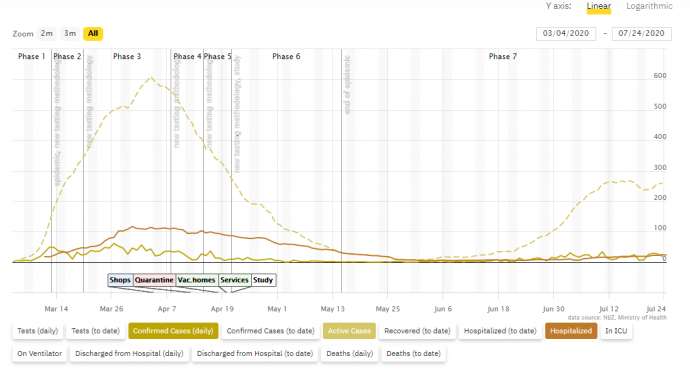STA, 24 July 2020- The Jožef Stefan Institute (IJS) has created a new model for forecasting the spread of the coronavirus. The institute estimates that the number of new cases is growing at an exponential rate - the figure doubles in 35 days, whereas the effective reproduction number is higher than 1, which means that "the epidemic might be getting out of hand".
In the coming period, between ten and 35 infections will be confirmed per day, projects the country's top research institute.
The institute says that the impact of imported infections is no longer relevant since the spread within the country has taken central stage now.
The seven-day average of the effective reproduction number - the number showing to how many people the infected person transmits the virus, currently stands at 1.16, whereas the three day-average is 1.55, warns the institute.
The IJS came up with four different scenarios of the epidemic unfolding, depending on the week-long average of the effective reproduction number.
If the figure was 1, meaning one secondary case per infectious case, the national death toll would increase to almost 150 by the end of September, the number of those hospitalised with Covid-19 would remain under 25 and the number of those in intensive care under 10.
Provided the effective reproduction number remained at 1.1, then the number of hospitalised Covid-19 patients would grow to nearly 50, the number of those requiring intensive care would be slightly bigger but still under 10, whereas the death toll would increase to more than 150.
In case an infected person spread the virus to 1.3 persons, 25 people would be in intensive care, close to 160 people would be hospitalised by late September and Slovenia would record almost 200 Covid-19 related fatalities.
In the event that the relevant figure stood at 1.5, same as the current three-day average, some 75 persons would require intensive care, more than 200 would be in hospital already during the second week of September, and the death toll would exceed 200 in mid-September.
Efforts should be stepped up to drive the effective reproduction number below 1 again, which would mean the epidemic is slowing down, urged the institute.
"Given the number of positive tests, the second wave of infections has so far resulted in a 70% decrease in the numbers of hospitalised patients, those in intensive care and the death toll compared to the first wave, presumably due to those infected being younger," said the IJS.
Meanwhile, the Medical Chamber said today that doctors were concerned over the developments, urging everyone to do all they could to ensure that the epidemic does not get out of hand during summer holidays when people tend to be more relaxed.
Doctors also pointed out that suspending health services again due to coronavirus concerns would put at risk many lives. They also called for protecting vulnerable groups.
Other health officials also expressed concern and called on citizens to behave responsibly, including National Public Health Institute (NIJZ) director Milan Krek and Bojana Beović, the head of the Covid-19 advisory team at the Health Ministry.
Krek told the STA that the virus was now primarily spreading from mass parties, and also from companies. "You can marry in these times, but you don't have to invite 200 people," he added.
If the number of infections starts to grow exponentially, the NIJZ will propose additional restrictive measures to the government, including limiting opening hours of shops, bars and restaurants.
What epidemiologists have noticed is that the number of infections is increasing also because infected persons do not want to reveal their contacts, Krek said, also inviting people to get tested if they have symptoms.
If the trend continues he said measures would be necessary because the capacity of the Slovenian healthcare system was limited and the authorities wanted to prevent other segments in the system from grinding to a halt.
Beović also said that the projections by the IJS were not so good, adding that the number of infected persons in Slovenia was going beyond the boundary which had been though to be manageable.
She too mentioned limits on bars and restaurants as one of the possible measures if the growth gets exponential, while measures on borders in order to prevent imported infections are also possible.
Beović said that complaining about the mandatory use of masks and hand sanitation is "nonsensical and unethical at this moment."
"If we do not adhere to this, we are in for unpleasant times," she told the STA, noting that there would also be "economic damage which will also impact human lives".
All our stories on coronavirus and Slovenia, while up-to-date statistics can be found here







